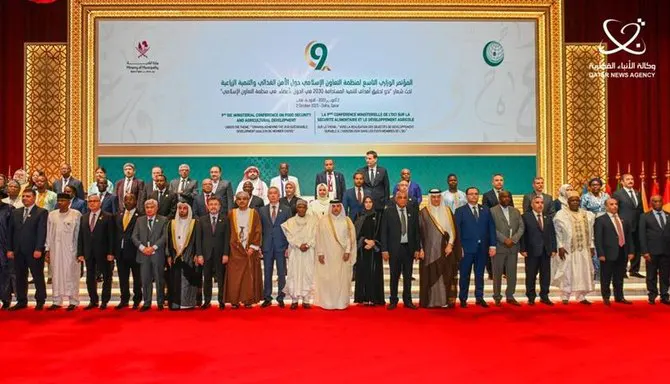The Ninth Ministerial Conference of the Organization of Islamic Cooperation on Food Security and Agricultural Development emphasized the importance of enhancing cooperation within the OIC framework in the food and agricultural sector.
The goal is to build more resilient food systems and achieve sustainable development objectives through knowledge exchange and the implementation of best practices. This will enhance food security and productivity.
Held in Doha, Qatar, from Oct. 1-2 under the theme “Towards Achieving the Sustainable Development Goals 2030 in the OIC Member States,” the confer-ence recognized the need to establish the necessary financial infrastructure and legal frameworks to improve financial inclusion for farmers.
The conference also highlighted the importance of supporting farmers by providing access to financial products and services, including Islamic finance models that can enhance economic resilience and increase production and income.
The final statement of the conference emphasized the significance of cooperation and coordination with relevant OIC institutions in conducting a study and developing a business model and cooperation framework for contract farming. Additionally, the conference aimed to assess the needs and capabilities of member states in this area. The study and business model will be presented for consideration and decision in the next session of the conference.
The participants of the conference expressed their appreciation to Qatar for hosting the event and acknowledged its role in supporting efforts to enhance food security in OIC member states.
Meanwhile, OIC Secretary-General Hissein Brahim Taha addressed the 6th session of the General Assembly of the Islamic Organization for Food Security in Doha on Tuesday.
Taha, through a statement delivered on his behalf by the assistant secretary-general for economic affairs, Ahmed Kawesa Sengendo, called for discussions on how the IOFS, as an OIC specialized organ, can support small farmers in OIC countries. The aim is to increase local food production, meet local and regional food demands, develop markets and reduce food wastage.
Taha highlighted that small farmers, constituting 76 percent of total farmers in OIC countries, often em-ploy traditional labor-intensive methods, resulting in low productivity.
He stressed the need for concrete action and effective programs and projects at national, regional and international levels to address the challenges posed by food insecurity in OIC countries.
Taha emphasized the importance of the IOFS’s role in implementing OIC projects and programs related to agriculture, rural development and food security. He called for a tangible focus on agricultural projects to promote agricultural growth.
The OIC chief also underscored the significance of fostering cooperation and synergy between member states, particularly in capacity-building, cooperative research programs and efficient resource management, to enhance agricultural productivity. Additionally, he highlighted the importance of encouraging technological innovation and implementing policies that promote capacity development and support investment.—PR










